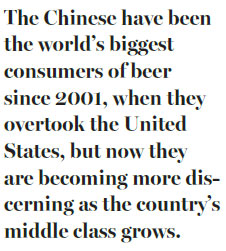Festival taps into a passion for real ale

But popular event cannot mask the fact that beer is losing its fizz with consumers, and sales around the world are falling flat
The sun is streaming through the arched glass roof of the Olympia exhibition center in west London, casting its rays upon thousands of beer drinkers below.
The venue normally hosts trade shows, but this week some of the crowd are wearing the Middle Eastern tarbooshes, Australian cork hats and other novelty headgear. All clutch special glasses to allow them to sample beers.
The event is the Great British Beer Festival, and if there was a single event that would confirm international prejudices about the hobby of British men drinking beer in the company of other men, this is it.

But it's important to stress that this is about real ale, rather than its more popular and bland cousin lager. Production of both beers starts in a similar way but much lager is filtered and pasteurized, while real ale continues to ferment in the barrel. When you drink real ale it still contains living organisms, like kimchi or live yogurt, and brands have a wide variety of flavors.
Beer production and consumption exist all over the world, but the popularity of real ale is particularly strong in Britain.
The crowds at the festival disguise the fact that worldwide consumption of beer is falling. According to the International Wine and Spirit Register, the volume of alcoholic drinks consumed globally fell by 1.4 percent in 2016 to 250 billion liters, driven by falls in beer consumption in China, Brazil and Russia.
Russia and Brazil are undergoing economic crises, but that doesn't explain what's going on in China. The Chinese have been the world's biggest consumers of beer since 2001, when they overtook the United States, but now they are becoming more discerning as the country's middle class grows. More are drinking wine, and beer drinkers are choosing more expensive beers and craft beers.

Brands like Tsingtao and Snow, which still dominate the Chinese market, are losing sales to foreign imports such as Belgian dark beers and expensive lagers.
It is a market ripe for products such as British real ales but very few of the producers at the festival seem to be operating in China. The only one that claims to be active is Inveralmond, a Scottish brewer from the city of Perth. This year the company sponsored major events such as the Shanghai Beer Music and Street Food Festival, and it has partnered with Chinese distributors.
It would be hard to replicate the British beer market in China. Real ale can be bottled, but it is best drunk in a pub, drawn from a barrel kept in a cellar managed by someone who knows how to look after the product and serve it. Normally, barrels of real ale do not travel far from brewer to pub.
Even that tradition is in decline in Britain. The Campaign for Real Ale, who organizes the Great British Beer Festival, estimates that pubs are closing at a rate of 21 per week - and have been for several years.
For them, the full benefits of beer can be best appreciated in a social situation such as a pub, drinking a healthy real ale in moderation. At the beer festival, there is no doubting the social atmosphere, but moderation is perhaps too much to ask.
The author is a senior editor at China Daily UK. Contact the writer at Conal@mail.chinadailyuk.com.
(China Daily European Weekly 08/18/2017 page11)
Today's Top News
- SOEs post stable revenue, profits in Jan-Nov
- First brew in Lhasa
- PLA fully capable of crushing secessionist attempts
- China holds central rural work conference
- President Xi to deliver New Year's message to ring in 2026
- Xi's diplomacy in 2025: Shedding light on a world at crossroads






























